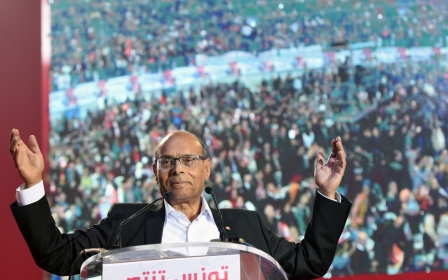Tunisia's Essebsi officially wins presidency with 55.68%

Beji Caid Essebsi of the Nidaa Tounes party was declared winner of Tunisia's presidential runoff with 55.68 percent of the vote, the country's electoral commission announced Monday.
His rival, outgoing President Moncef Marzouki, came in second with 44.32 percent, the commission said.
Voter turnout, the commission added, stood at 60.11 percent of the country's registered voters.
Tunisians took to the polls on Sunday for the leadership runoff vote, with many calling the ballot a landmark for democracy in the country where the Arab Spring was born.
Essebsi, an 88-year-old veteran of previous Tunisian governments, said in an address to his rival after voting closed: "We must work together for the future of Tunisia."
"Marzouki has congratulated Mr. Essebsi on his presidential election win," Adnan Mansar, director of Marzouki's election campaign, wrote on his Facebook page.
Marzouki's campaign had earlier conceded defeat in Sunday's presidential runoff vote.
It is the first time Tunisians have freely elected their president since independence from France in 1956.
A first round on November 23 saw Essebsi win 39 percent of the vote, six percentage points ahead of Marzouki, a 69-year-old former rights activist installed by parliament two months after December 2011 polls.
Nidaa Tounes won parliamentary polls in October, making Essebsi favourite to be the next president, but with powers curbed under constitutional amendments to guard against a return to dictatorship.
The campaign was marked by mudslinging, with Essebsi refusing to take part in a debate with Marzouki, claiming his opponent was "extremist".
Essebsi insists that Marzouki represents Islamists, charging that they had "ruined" the country since the 2011 revolution which toppled veteran ruler Zine El Abidine Ben Ali and sparked the Arab Spring.
Marzouki in turn accused Essebsi, who served as a senior official under previous regimes, of wanting to restore the old guard deposed in the revolution.
Many protesters in the south of the country took to the streets demonstrating against Essebsi, accusing him of vote rigging.
"I appeal to all our sons in the south to stay away from violence," Essebsi said in a speech aired on state television.
"I will be a president for all Tunisians," Essebsi said, going on to thank Marzouki and pledged to work with him.
On his part, Marzouki said that he will not challenge the results of the country's presidential runoff election.
"We will not go to courts or lodge appeals," Marzouki said in speech aired on national television late Monday.
"I'm preoccupied with stability and stability can be achieved by calming nerves," he said, going on to call on his supporters in southern provinces to calm down following the vote results.
Tunisia also faces major economic challenges.
Its economy is struggling to recover from the upheaval of the revolution, and there are fears of widespread joblessness causing social unrest.
Monday's edition of the French-language La Presse newspaper said Tunisia was still experiencing "investment failures, an alarming unemployment rate, purchasing power at its lowest and a totally disordered social situation".
Middle East Eye propose une couverture et une analyse indépendantes et incomparables du Moyen-Orient, de l’Afrique du Nord et d’autres régions du monde. Pour en savoir plus sur la reprise de ce contenu et les frais qui s’appliquent, veuillez remplir ce formulaire [en anglais]. Pour en savoir plus sur MEE, cliquez ici [en anglais].




